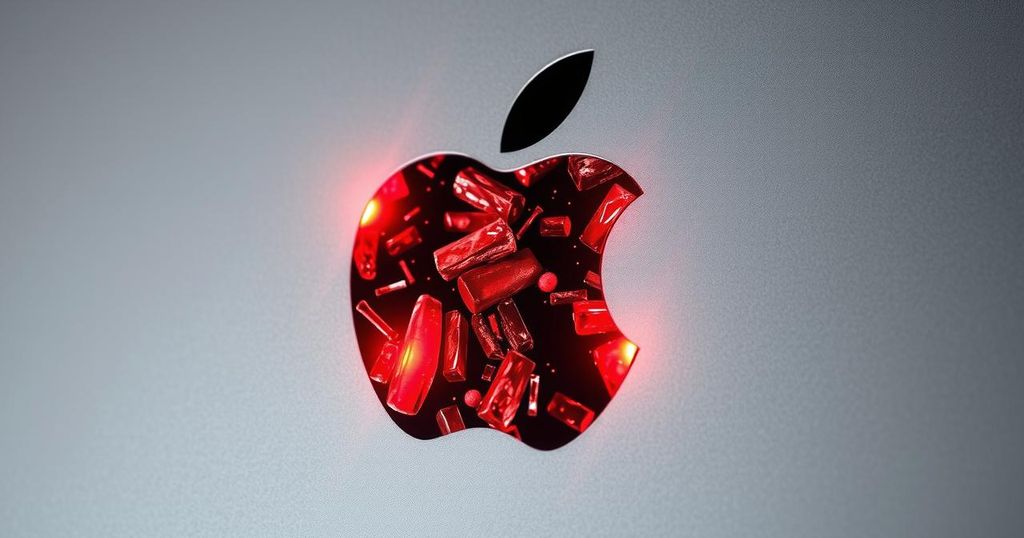economics
Technology
ACCIDENTS, AFRICA, AL JAZEERA, APPLE, CHRISTOPH N VOGEL, CONFLICT MINERALS INC, CORRUPTION, DRUG TRAFFICKING, ECONOMICS, EUROPE, FRANCE, GAO, INC, LEGAL, OECD, ORGANISATION FOR ECONOMIC CO - OPERATION AND DEVELOPMENT, RWANDA, SAHARAN AFRICA, UNITED STATES GOVERNMENT ACCOUNTABILITY OFFICE, US
Jamal Walker
0 Comments
DRC Accuses Apple of Using Conflict Minerals in Supply Chain
The DRC has filed charges against Apple’s European subsidiaries for allegedly using conflict minerals sourced from the region. The country claims Apple’s supply chain misrepresents morally sourced minerals, while violations by armed groups in the DRC continue. This issue reflects broader concerns regarding corporate accountability in conflict zones and the ethical sourcing of minerals.
The Democratic Republic of the Congo (DRC) has initiated criminal charges against Apple’s subsidiaries in France and Belgium concerning the alleged utilization of “conflict minerals” originating from sub-Saharan Africa. Lawyers acting on behalf of the DRC assert that Apple’s European operations are employing these conflict-afflicted minerals while misrepresenting their supply chain as ethically sourced. This controversy raises fundamental issues surrounding the sourcing of minerals like tantalum, tin, tungsten, and gold from regions plagued by systemic violence and human rights abuses.
Conflict minerals are defined as minerals extracted from areas impacted by conflict, where they are often exploited for funding armed groups. Specifically, the DRC is a significant area for the extraction of the primary conflict minerals collectively termed “3TGs” (tin, tungsten, tantalum, and gold). Christoph N. Vogel, an expert in the field, explained that these minerals often come from war-torn regions, contributing to further violence and exploitation. For instance, armed groups in the DRC manipulate the labor market and smuggle minerals across borders, undermining local economies and welfare.
In September of the previous year, following consultations with legal representatives from Amsterdam & Partners, the DRC’s President Felix Tshisekedi launched an inquiry into the minerals exported from Congolese territory. This action stemmed from concerns regarding the implication of Apple’s supply chain in illegal mineral sourcing. Upon the investigation’s conclusion, the legal team asserted that Apple’s supply chain was potentially compromised by so-called “blood minerals”. However, Apple denied any wrongdoing, claiming it did not find substantial evidence linking its suppliers to funding armed conflicts in the region.
The DRC continued its legal pursuits, leading to the formal charges filed in December. Robert Amsterdam, a lawyer handling the case, remarked that Apple, as a trillion-dollar company, must assume accountability for its procurement practices. Concurrently, underlying the litigation is the broader concern regarding human rights violations and the ethical sourcing of minerals in the tech industry.
The legal action against Apple is situated within a larger context of international scrutiny related to mining practices in conflict zones. The European Union has established regulations intending to ensure responsible sourcing of conflict minerals, contributing to global efforts aimed at breaking the link between mineral sourcing and violence. The DRC seeks accountability not only from Apple but aims to invoke a wider change in the supply chain practices of multinational corporations. Global Witness, a prominent NGO, has previously identified several companies engaging in similar controversial practices, including tech giants like Apple and Samsung.
The Democratic Republic of the Congo (DRC) is a country rich in mineral resources, particularly tantalum, tin, tungsten, and gold, which are categorized as conflict minerals. These minerals are often linked to funding armed conflicts, particularly in regions where mining operations are controlled by militias. The DRC has been engulfed in conflict for over thirty years, with numerous armed groups competing for control of the lucrative mineral resources. As a response to these issues, international regulations have been proposed to ensure responsible sourcing and mitigate human rights abuses linked to mineral extraction.
The allegations against Apple underscore a significant challenge in the tech industry related to sourcing minerals from conflict zones. The DRC’s legal action highlights the pressing need for accountability among corporations to ensure their supply chains do not perpetuate violence and exploitation. As this case unfolds, it may influence stricter adherence to ethical sourcing practices within the technology sector and international regulations governing conflict minerals.
Original Source: www.aljazeera.com




Post Comment